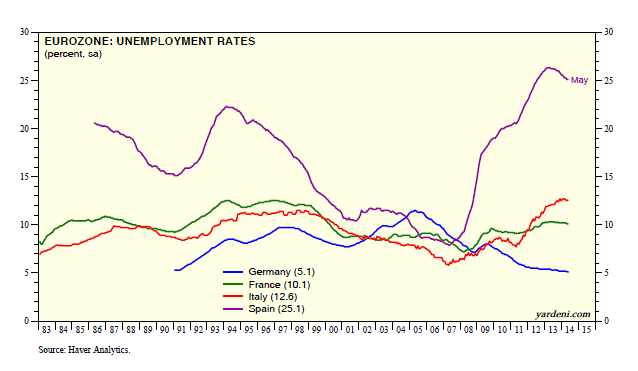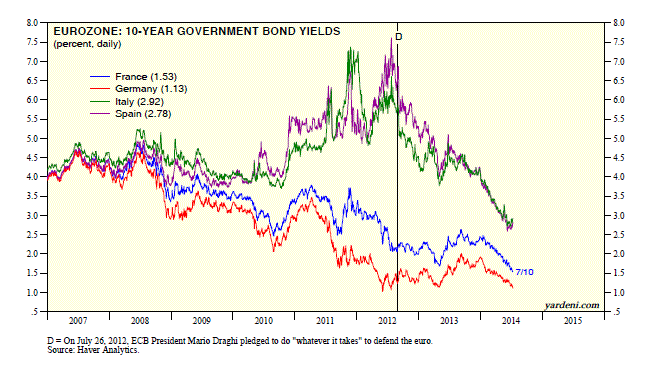
During the second half of the 1990s, the looming introduction of the euro led to a sharp drop in borrowing costs among the peripheral economies of the Eurozone. That boosted their economies and the region’s overall economy. The Italian unemployment rate fell from its 1998 peak of 11.5% to 5.8% during 2007. The Spanish jobless rate plunged from a 1994 high of 22.3% to 7.9% during 2007. Those rates have risen since then to 12.6% in Italy and 25.1% in Spain. French joblessness is currently at 10.1%, up from a recent low of 7.2% during 2008. On the other hand, Germany’s unemployment rate is only 5.1% currently, the lowest since reunification during 1990.
The low bond yields of the previous decade set the stage for the Eurozone’s sovereign debt crisis by allowing governments to borrow too much. It started in Greece during 2010, spreading rapidly to the other peripheral countries as their bond yields soared through the summer of 2012. The Eurozone fell into a recession during Q4-2011, with real GDP declining during six consecutive quarters. Draghi’s “whatever-it-takes” speech of July 26, 2012 turned the situation around surprisingly well, as yields subsequently plunged in the peripherals and real GDP rose modestly for the past four quarters through Q1-2014.
The problem is that the drop in yields has spread to the core countries this year, with the German and French yields now down to only 1.1% and 1.5%. The Eurozone’s recovery since last summer has been lackluster at best and is showing signs of stalling. Industrial production excluding construction is up only 1.7% y/y in Germany, down 3.7% y/y in France (the weakest reading since November 2012), and down 1.8% y/y (wda) in Italy. Deflation has become a concern, as the CPI inflation rate has dropped close to zero.
In fact, the Eurozone isn’t officially out of the recession that started during Q4-2011. On June 16, the CEPR Euro Area Business Cycle Dating Committee concluded that the “lack of evidence of sustained improvement of economic activity in the euro area does, however, preclude calling an end to the recession that started after 2011Q3. …in spite of several quarters of positive (but weak) economic developments…”
Today's Morning Briefing: Eurosclerosis Déjà Vu?(1) Another summertime panic attack in Europe. (2) Draghi wants more reforms. (3) Europe’s arteries hardening again. (4) Introduction of the euro set the stage for current crisis in the Eurozone. (5) Bond yields approaching zero in Germany and France. (6) Eurozone’s weak recovery stalling as region remains officially in recession. (7) EMU MSCI forward revenues and earnings remain depressed. (8) Will the P/E-led rally continue? (9) ECB’s stealth QE. (10) Eurozone banks: To lend or not to lend? (11) “Stay Home” still outperforming “Go Global” YTD. (12) Weak numbers out of China and Japan. (13) Yellen testifies. (14) “Dawn of the Planet of the Apes” (+ +).

